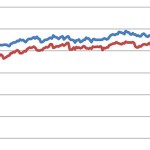Even Minimal Take from Table Games May Be Overstated
On RIPR, Ian Donnis has drawn attention to the fact that the General Assembly has yet to propose a revenue split between gambling facilities and the state for table games:
With gambling providing Rhode Island’s third-largest source of revenue, the state receives 61 percent of the revenue from the thousands of video lottery terminals at Twin River and Newport Grand. The national average for what states get from table game revenue is far lower; Twin River spokeswoman Patti Doyle says a “starting point” of 12.5 percent “is a really good place to start the conversation.”
As I’ve pointed out, talk of table games has reared its head, this time around, as an imperative to shore up state revenue in the face of forthcoming casinos in Massachusetts. However, the amount that Christiansen Capital Advisors (CCA) projects that table games will preserve in the government’s take is relatively small — only about $21 million of a $139.5 million drop from same-year estimates. That estimate, however, is based on a government take of almost three times Doyle’s “starting point”:
As there currently is no law in the State of Rhode Island authorizing table games, and thus no framework for determining the State’s share of table game revenue and statutory expenses for the operation of table games, we assumed a total revenue share to the State of 35.0 percent, which is consistent with other eastern states that have added table games to previously slot machine or VLT-only operations including Delaware (33.9 percent including distributions to purses and other earmarks) and West Virginia (35.0 percent including purse distributions and other earmarks), but higher than Pennsylvania, where the state’s share of table game revenue started at 16.0 percent in the first year and now stands at 14.0 percent (12.0 percent State, 2.0 percent local).
To be sure, a spokeswoman for Twin River has incentive to plant a low-balled number in the public mind as her company negotiates with state officials over how much gambling revenue the government should take. However, as the public considers the proposition of casinos in Rhode Island, it should do so with a realistic understanding of the numbers involved. In the “likely case” scenario (that is, with the most-likely locations of MA casinos in CCA’s view), introducing table games into the RI gambling mix may only wind up preserving around $9 million per year in revenue for the state.
Given RI voters’ reluctance to open the door to casinos in the past, they may not find that amount of savings to justify the change. And a desire to keep hard numbers out of the discussion may help to explain the “closed-door meetings” that Donnis describes.


